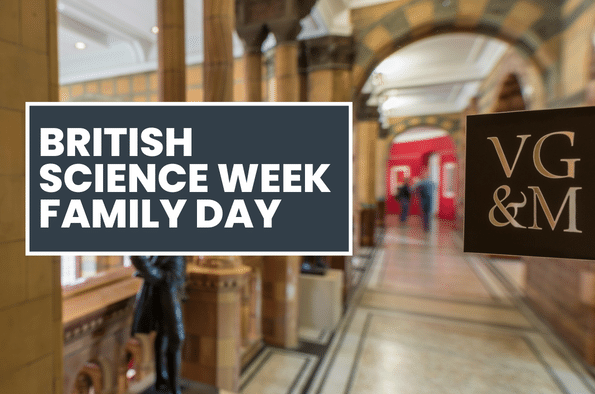
Sustainability at the British Science Week Family Day
- Sustainability Team
- Suitable for: Staff, students and general public
- Admission: Free
- Book now
Add this event to my calendar
Click on "Create a calendar file" and your browser will download a .ics file for this event.
Microsoft Outlook: Download the file, double-click it to open it in Outlook, then click on "Save & Close" to save it to your calendar. If that doesn't work go into Outlook, click on the File tab, then on Open & Export, then Open Calendar. Select your .ics file then click on "Save & Close".
Google Calendar: download the file, then go into your calendar. On the left where it says "Other calendars" click on the arrow icon and then click on Import calendar. Click on Browse and select the .ics file, then click on Import.
Apple Calendar: The file may open automatically with an option to save it to your calendar. If not, download the file, then you can either drag it to Calendar or import the file by going to File >Import > Import and choosing the .ics file.
To celebrate British Science Week, the Victoria Gallery & Museum are going to experiment with everything from ancient sea creatures to robots and computers; explore themes of sustainability, climate, microbiology and animals, PLUS science-themed puzzles and games all hosted by REAL scientists, doctors, researchers and experts from the Universities of Liverpool and Salford.
It’s going to be RADIOACTIVE (and FREE!)
Who’s coming?
In the Waterhouse Café
Dr Chloe James from the University of Salford will join our team of University of Liverpool researchers to teach you all about phages, the most abundant organisms on Earth.
Phages are viruses that infect bacteria and have a fundamental impact on all life. The research that this team does is uncovering how phages affect bacteria in the body, which could offer new ways to fight bacterial diseases. Come to learn more with our giant models and make your own sparkly phage to take home.
In the Learning Suite
• Inspired by the VG&M’s new Green Futures family resource, Lorna Kernahan will help you to become an archaeologist and investigate what life was like 10,000 years ago. Discover where people lived, what they ate and the tools they used. Create your own cave painting inspired by Neolithic art. Learn about the importance of looking after the sea and make your own recycled jelly fish and sea animals.
• The University’s Sustainability Team will introduce how the University is tackling the climate and ecological issues faced across the world. Play the 'how bad are bananas?' game to explore carbon emissions and create your own climate change poster.
• Ever wanted to grow your own food and don’t know where to start? Join Rose Froud from Ness Botanic Gardens and discover how to grow simple veg and herbs. Enjoy a bit of indoor gardening by sowing salad or herb seeds to take home. You’ll enjoy watching them grow on your kitchen windowsill.
• Jamie Hall will introduce you to the secret life of microbes! We will reveal some of the beautiful and intriguing microscopic life-forms we share the planet with. Using microscopes, agar plates, and design-a-microbe activities. visitors will learn about microbial diversity and how University scientists study tiny life-forms.
In the Leggate Theatre
• Join Jessica Gay from the Liverpool Language Lab for some fun language-related games, including the ‘object memory game’ and ‘odd one out’. These games explore how being able to label objects helps children with memory and how using words helps them problem solve and organise their thinking.
• Programming lets us ‘speak’ to machines and robots in a way they understand. Become a programmer just like the Uni’s Emily Johnson and practice sending commands to a real robot to make it move, beep, light up and avoid obstacles! You’ll also get a chance to program a tiny computer, creating alarms, name badges or games.
• From hoofbeats to heartbeats, furry friends and future vets, come and explore some paw-sitive discoveries with the Veterinary Science Department’s Roshan Hall! Can you find a dog’s heartbeat? Do you know where a horse’s knee is? Might you have what it takes to become a vet? Come along and find out!
• Sarah Annand from the University’s Faculty of Science and Engineering is here to help you discover how radioactive materials decay over time. You will be able to test everyday objects for radioactivity using Geiger counters and understand what being radioactive means and how we can we use it to our advantage and save lives!
